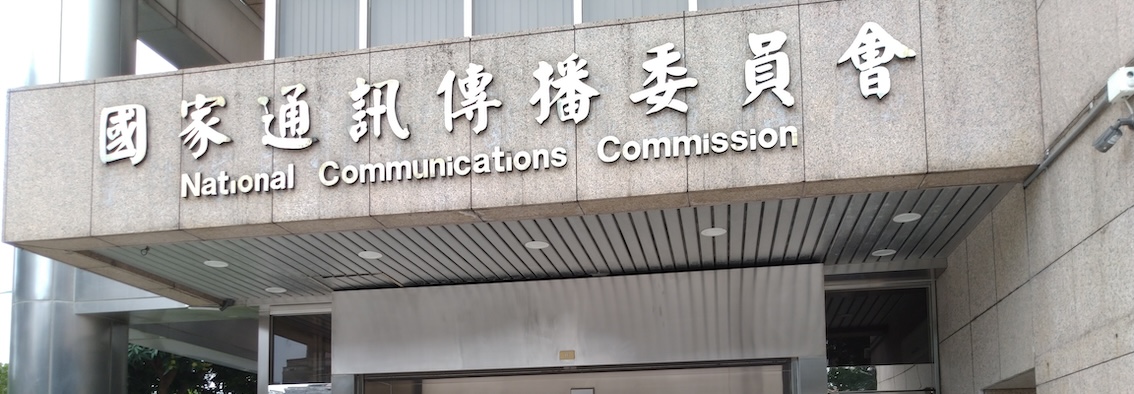Introduction: A Stalemate in the Legislative Yuan
Recently, Taiwan’s National Communications Commission (NCC, 國家通訊傳播委員) has been put into a peculiar situation as a partisan deadlock has halted the NCC from carrying out its duties. In November 2024, the Legislative Yuan (LY, 立法院) amended the NCC National Organization Act (國家通訊傳播委員會組織法), which as of December 1, 2024, capped NCC commissioners at two terms in office. The decision led to Acting Chairman Won Po-Tsung’s (翁柏宗) dismissal (who served as a commissioner since 2014), throwing the commission’s future into uncertainty as its operations have been grounded to a halt. Currently only three of the NCC’s seven total commission seats are filled, one seat short of the four required number of commissioners to resume NCC duties. Back in May of 2024, the Legislative Yuan’s Procedure Committee proposed a bill to nominate four new commissioners including Wong Po-tsung as the official NCC chair, as well as Chen Ping-hung (陳炳宏), Lo Huei-wen (羅慧雯), and Chan Yi-lien (詹懿廉). However nine Kuomintang (KMT, 國民黨) members of a 15-member LY committee voted against the bill, with one Taiwan’s People Party (TPP, 民眾黨) lawmaker abstaining. Essentially, by obstructing new nominations, the KMT and TPP are exerting pressure on the ruling Democratic Progressive Party (DPP, 民進黨) to negotiate appointees who are more favorable to their interests. From the opposition KMT-TPP coalition perspective, the amendment was a necessary corrective measure to restore balance and limit what they view as prolonged partisan control by the DPP party over the NCC. In contrast, from the DPP perspective, the term limits—which now leave the NCC without enough commissioners—are weakening the integrity of the commission, as the standstill threatens the continuity of regulatory governance.
In response to this deadlock, on August 2, 2024, two civil society media reform organizations, the Taiwan Media Watch Foundation (台灣媒體觀察教育基金會) and the Campaign for Media Reform (媒體改造學社) published a joint statement urging for personnel to be reviewed as soon as possible to ensure normal operations. According to the Taipei Times, the Commission can currently advance consultations, but it cannot issue a ruling on any of the 104 items it regulates. As a result, the commission is unable to convene meetings and discuss critical issues such as the renewal of broadcasting licenses. Meanwhile, 37 TV and radio stations, including International Community Radio Taipei (ICRT, 台北國際社區廣播電台) and Taiwan Plus, are due for license renewals before June 2025. Recently, the current acting NCC chair, Chen Chung-shu (陳崇樹), described the delay in license renewal as being by no means the fault of the operators, and has instructed terrestrial and cable channels to continue operations as usual. Both ICRT and Taiwan Plus are English-language media outlets that are essential for Taiwan’s messaging to the international community. However, the NCC’s inability to renew licenses leaves broadcasting companies in a legal gray area. The current paralysis of the NCC underscores deep systematic problems: while the commission is constitutionally independent, it is constantly subject to partisan struggle. At a time when Taiwan is a striving democracy that wishes to project its voice to a more international audience, the NCC must prioritize ensuring a more stable, transparent, media environment.
Historical Context
The tensions surrounding the regulation of Taiwan’s media landscape is deeply entangled in the context of Taiwan’s history. From 1949-1987, Taiwan underwent a period of authoritarian martial law under the Kuomintang government. Media was strictly controlled with only three terrestrial TV stations: Taiwan Television (TTV), China Television (CTV), and Public Television Service (PTS). Censorship was widespread and opposition voices had little access to broadcasting licenses. After martial law was lifted in 1987 and the 1993 Broadcasting Act (also known as the Cable TV Act [有線電視法]), was passed, the government’s monopoly on media gave way to private TV networks and cable news channels. The NCC—the regulatory body responsible for overseeing telecommunications—was established as an independent agency in 2006 “to regulate the communications sector from an objective, neutral, and professional standpoint.” While these reforms and the establishment of a regulatory body has allowed for a diverse and vibrant media landscape, media outlets are perceived as heavily-biased and entrenched along party lines. According to Reporters Without Borders, despite having a free and open press, Taiwan ranks 27 out of 180 nations for trust in its media landscape, citing strong political polarization, sensationalism, and pursuit of profit as reasons for low levels of objective reporting. Additionally, according to Taiwan’s “2023 Government Heads Satisfaction Survey,” the head of the NCC received the lowest satisfaction rate among Taiwanese citizens across all government agencies, at 22.36 percent. This begs the question, why is the NCC so unpopular? From what can be observed, the continuous tension surrounding Taiwan’s media landscape seems to stem from ongoing struggles over political influence in the NCC, media ownership, and questions of the NCC’s actual regulatory independence.
Corporate Interest and National Security
One can examine an incident related to broadcast licensing that took place within recent years. In November 2020, the NCC made a decision to deny a six-year license renewal for CTiNews. This was the first time a license renewal was rejected since the agency’s founding. When addressing the reason behind the denial, the NCC cited concerns over editorial independence and national security related to the station’s overtly pro-China stance. In particular, there were concerns over the background of the owner, Tsai Eng-Meng (蔡衍明). In addition to being the owner of Chung T’ien Television (CTV)—the operator of CTiNews—as well as the China Times newspaper in Taiwan, Tsai runs Want Want Holdings Limited, a subsidiary of a Taiwan- and China-based beverage company. As a recipient of generous subsidies from the Chinese government for Want Want Holdings Limited, Tsai was accused of a conflict of interest. CTiNews had continuously received complaints for exhibiting a pro-Beijing bias in its broadcasting and was fined over twenty-one times during the span of six years for failing to fact-check before reporting the news, and thus violating the Satellite Broadcasting Act (衛星廣播電視法). The fines amounted to NTD 10.73 million (USD 374,000). The DPP supported this decision, accusing CTiNews of sabotage and spreading disinformation, while the KMT accused the government of suppressing freedom of speech. Currently, CTiTV’s media presence has mostly moved online. Despite the Taipei High Administrative Court’s 2023 decision to rule in favor of CTiTV’s lawsuit against the NCC for failing to renew CTiNews’ broadcasting license, the station has not resumed cable broadcasting. While the NCC acted on regulatory grounds, the absence of a separate national security review mechanism forced the commision into a politically-charged role. As a result, a regulatory decision that should have been interpreted as the protection of journalistic media standards was instead framed by the opposition party as political censorship. This highlights a problem that the NCC can never escape: the dire need for structural reforms to separate technical licensing oversight from national security-related media reviews.
The 2020 controversy was not the first time Want Want Holdings Limited found itself under scrutiny in Taiwan. When Want Want acquired the China Times Group and attempted to buy Taiwan’s second largest cable provider, China Network Systems between 2012 and 2013, major protests broke out in response involving students, journalists, and activists opposing the consolidation of pro-China media outlets. This movement is known as the Anti-Media Monopoly Movement (反媒體壟斷運動).

Image: 2012 Anti-Media Monopoly Movement. Sign reads “The Judiciary Needs Democracy, Media Needs Independence.” (Image Source: Shih-Shiuan Kao Wikimedia Commons.)
Despite CTiNews losing its broadcasting license, Want Want still owns several major media platforms across TV, newspapers, and the internet, the latter of which is completely unregulated. Thus, the government needs to amend current legislation regulating the media landscape in Taiwan, including the Radio and Television Act (廣播電視法), Cable Radio and Television Act (有線廣播電視法), and the Satellite and Broadcasting Act (衛星廣播電視法). Former NCC Commissioner Wang Wei-Ching (王維菁) has stated, “The NCC’s legal tools are outdated and difficult to amend, yet they remain the basis for all decisions. As a result, the public often finds it hard to understand the outcomes, perceiving the NCC as a relic from the dinosaur era.” [1] What currently exists is a patchwork of laws regarding media ownership that doesn’t address cross-media ownership or monopolies.Recognizing this issue, the DPP has attempted to draft legislation to update current regulations, including the addition of anti-monopoly provisions to all three acts of broadcasting regulation, and the NCC submitted the first version of the bill (the Prevention of Broadcasting and Television Monopoly and the Maintenance of Diversity Act) in 2013. However, the KMT majority in the LY guaranteed that the bill never had a real chance at passing.
The Nomination Process
A major issue arises from the structural design of the NCC itself and the nomination process for commissioners. According to a former NCC commissioner, Lin Lihyun (林麗雲), when the National Communications Commission was founded, commissioners were nominated by separate political parties in the LY. [2] This ensured balanced representation and a diversity of perspectives. In a similar way, the FCC in the United States ensures a balance of representation across political parties by maintaining that no more than three commissioners (out of five total) can belong to the same political party—with the party of the current president entitled to one more seat and the right to appoint the chair.
However, in 2008, Taiwan’s Constitutional Court ruled that government agencies should function in a coordinated manner, allowing the membership of the seven-person commission, including the positions of the chair and vice chairpersons, to be nominated by the Premier, the head of the Executive Branch. The list of nominees are then designated for approval by the LY. By custom, commissioners are expected to be professionals with experience in law, technology, and media with a neutral or non-partisan background. In reality, nominees are not so apolitical and whichevers political party has control of the Executive Branch, controls the policy direction of the NCC. Wang commented, “Commercial and corporate forces also realize that the NCC can be swayed politically, so they increasingly use political channels to influence its decisions. This erodes the NCC’s independence and fairness.” [3] An anonymous telecommunications expert has argued that “In practice, this allows the Executive Yuan to influence the NCC through its leadership. The chairperson, in particular, plays a central role in shaping the commission’s agenda, including deciding which cases are brought forward for review.” It is not inherently problematic for one political party to have more sway over the direction of policy within a given presidential term. However, in the case of Taiwan, the NCC’s winner-takes-all nomination system means that the DPP has dominated the nomination process for NCC commissioners since it took control of the presidency in 2016.
How to Reform the NCC
Near-Term Reforms:
- In order to rebuild public trust in the independence of the NCC, the nomination process must reflect political diversity. The National Organization Act (國家通訊傳播委員會組織法) must be amended to create a proportional nomination process. A commission within the Executive Yuan should be formed with guaranteed representation from all political parties. The Executive Yuan should share publicly-available information regarding the political affiliations of the commissioners. In the future, this will prevent one single political party from controlling the entire process for the selection of commissioners. Lin added, “We can learn from the Korean model (Korean Communications Commission). The vice chairperson can be elected by the commissioners themselves to reduce external political influence.” [4]
- The LY must pass the Media Pluralism Maintenance and Anti-Trust Act, an updated draft to the 2012 proposed antitrust act. The Act includes provisions to set clear boundaries to prevent excessive control by a single entity across various media platforms, including television, radio, newspapers, and online outlets. The most recent draft is ambitious in addressing cross-ownership, national security, editorial independence, and digital platforms. However, to prevent the much needed legislation from stalling in the LY, legislators should break up the Act into two or three bills to address specific areas of concern. Lawmakers must clearly frame such legislation just in economic terms, but as a method to protect Taiwan’s democracy from foreign influence and ensure a free, independent, and diverse media landscape.
- The LY must also pass the Digital Intermediary Services Act (DISA, 数位中介服务法). The Act, proposed by the NCC, aims to tighten regulations on digital media and curb disinformation linked to foreign influence campaigns. Current law only regulates traditional media (TV, radio, cable), but over-the-top (OTT) media such as social media and streaming platforms are barely regulated. DISA would bring online platforms under the same accountability frameworks that traditional broadcasters already face, closing the biggest outstanding regulatory gap.
Long-Term Policies:
- The Satellite Broadcasting Act should be amended to limit foreign ownership in non-traditional media. The Act does limit foreign ownership for broadcasting companies to less than 50 percent, but this does not address ownership in other forms of media. It may be worth developing an ownership security review board, similar to Committee on Foreign Investment in the United States (CFIUS) in the United States, providing a mechanism to screen companies for foreign investment in critical industries, including media. If an alternative institution conducts a national security pre-screening for foreign ownership, the NCC could avoid situations such as the Want Want controversies of 2012 and 2020. In these cases, the NCC’s main legal authority should have been to grant or renew licenses, not to review ownership structures or national security risks. Under this system, an ownership change in a media company should trigger a mandatory reassessment by the national security review board.
The main point: The current stalemate regarding confirmations of National Communications Commission appointees is revealing its underlying structural issues. To rebuild public trust in the NCC and update current regulations, the current nomination process needs to be reformed, the Legislative Yuan should pass the Media Pluralism Maintenance and Anti-Trust Act and the Digital Intermediary Services Act, and the Satellite Broadcasting Act should be amended.
[1] Interview with Former NCC Commissioner Wang Wei-Ching, April 12, 2025
[2] Interview with Former NCC Commissioner Lin Lihyun, April 9, 2025.
[3] Interview with Wang Wei-Ching, April 12, 2025.
[4] Interview with Lin Lihyun, April 9, 2025.





